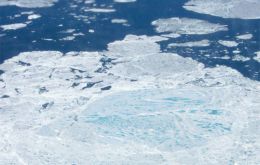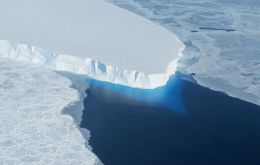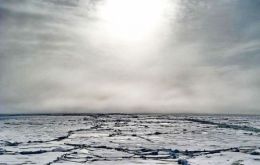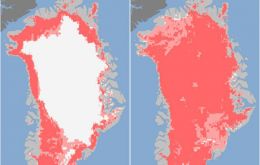MercoPress. South Atlantic News Agency
Tag: ice melt
-
Tuesday, September 9th 2014 - 04:11 UTC
Antarctica sea levels rising faster because of fresh water from melting glaciers, say researchers

Sea levels around Antarctica are rising faster than anywhere else in the southern ocean. The global average rise in ocean heights in the last 19 years has been 6cms, but the rise in seas around Antarctica is 2cms higher.
-
Thursday, June 12th 2014 - 07:32 UTC
Researchers find major West Antarctic glacier melting from geothermal sources

Thwaites Glacier, the large, rapidly changing outlet of the West Antarctic Ice Sheet, is not only being eroded by the ocean, it's being melted from below by geothermal heat, researchers at the Institute for Geophysics at The University of Texas at Austin (UTIG) report in the current edition of the Proceedings of the National Academy of Sciences.
-
Wednesday, May 14th 2014 - 00:15 UTC
West Antarctica glaciers' melting 'have passed the point of no return', says NASA study

A new study by researchers at NASA and the University of California, Irvine, finds a rapidly melting section of the West Antarctic Ice Sheet appears to be in an irreversible state of decline, with nothing to stop the glaciers in this area from melting into the sea.
-
Tuesday, August 28th 2012 - 04:58 UTC
Rapidly eroding ice cap and thickness makes the Arctic even more vulnerable

Arctic has lost more sea ice this year than at any time since satellite records began in 1979, Nasa says. Scientists involved in the calculations say it is part of a fundamental change. What is more, sea ice normally reaches its low point in September so it is thought likely that this year's melt will continue to grow.
-
Wednesday, July 25th 2012 - 07:42 UTC
Greenland’s massive ice sheet “unprecedented” melt puzzles Nasa scientists

Greenland's massive ice sheet has melted this month over an usually large area, Nasa has said. Scientists said the “unprecedented” melting took place over a larger area that ever detected in three decades of satellite observation.
